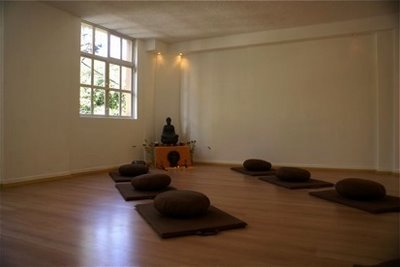new FWBO Centre in Mexico
Why opening a new FWBO centre in Mexico City?
Some facts. Mexico City is the capital city of Mexico It is the most important economic, industrial, and cultural center in the country; the most populous city with over 8,836,045 inhabitants in 2008. Greater Mexico City (Zona Metropolitana del Valle de Mexico) has a population exceeding 22 million people, making it the second largest metropolitan area in the western hemisphere and the third largest in the world by population according to the United Nations.
The majority (90.5%) of the residents in Mexico City are Roman Catholic, a higher figure than the national percentage, even though it has decreased over the last decades. However, many other religions and philosophies are also practiced in the city: there are many different types of Protestant groups, different types of Jewish communities, Buddhist and other philosophical groups, as well as atheism. Buddhism in Mexico possesses a minuscule demographic presence. Approximately, only 108,701 Buddhists are counted in the whole of Mexico.
Up until now, Mexico City (and the whole country) has counted with one FWBO Centre, which is located in the Colonia Roma. La Roma (as it is also known) is a neighborhood in the central borough of Cuauhtemoc in Mexico City. Undoubtedly, the Mexico City Buddhist Centre under the chairmanship of Dharmacari Upekshamati has made a significant contribution to spreading not only the Dharma but also Bhante's vision in Mexico for the last fourteen years. The Centre's beautiful venue is visited by hundreds of people every week attracted by the varied program of Buddhism and Meditation that it offers.
However, the interest in the Buddhadharma and the FWBO approach is growing and the city is big enough to house not one or two but even more centres! Buda Mandala, the new FWBO centre will be located right in the heart of Coyoacn. Coyoacn is one of the 16 boroughs into which Mexico's Federal District is divided. The name Coyoacn also is commonly used to refer to the neighborhood at the heart of the borough, and it comes from the Nahutl Coyohuacan meaning, "place where there are coyotes". Although geographically located in the center of the city, Coyoacn has long been considered to be at the southern end of Mexico City.
For a few decades now, Coyoacn has been visited by alternative groups of people like bohemians, street musicians, writers, philosophers, etc. who were in search of relaxed and non-mainstream social places to gather, so they began having an important presence in Coyoacn. These social groups eventually gave the place its distinctive cultural and artistic atmosphere. Needless to say, Coyoacn is nowadays one of the preferred and most visited places in the city.
The Buda Mandala collective believes that, it is precisely its non-mainstream, relaxed, cultural and artistic atmosphere what makes Coyoacn a suitable place for spreading the Buddhadharma through an FWBO Buddhist Centre. Indeed, the first FWBO centre in Mexico City, the one that is now in La Roma, had its first venue in Coyoacn where it proved to be a success.
At present, Yoga Espacio, the yoga, meditation and healing centre opened in 2007 by a collective led by Jnanadakini and Kavindu is also located in Coyoacn. Yoga Espacio offers a modest program on Buddhism and Meditation led by Kavindu and supported by Chandramsu and Vimuktin. Buda Mandala may be a natural place to channel people from Yoga Espacio that wish to get more involved with the movement in a Buddhist venue that offers the whole range of activities of a FWBO centre. The Mexico City Buddhist Centre has also some presence in Coyoacn on Sundays introducing Buddhism and Meditation.
Buda Mandala's Vision, Mission and Values
Vision
Our vision is of a World in which every human being can fulfill their full potential, in order to contribute in a positive manner to the building of a peaceful society, which protects other sentient beings and the Earth.
Mission
Our mission is to communicate the teachings of the Buddha, as taught by Urgyen Sangharakshita, the founder of the Western Buddhist Order, in a way that is relevant to different social groups in Mexico and Latin America. We recognise that aiming to do this requires a balance between honouring our understanding of the Order and Movement's central practices and teachings, and an inspired and imaginative way of presenting them.
Values
(Having) well obtained this human existence,
I've been born in the family of [the] Buddha
And now am one of [the] Buddha's Sons (and Daughters).
Thus whatever actions I do from now on
Must be in accord with the family.
Never shall I disgrace or pollute
This noble and unsullied race.
Labels: Dharmaduta, Mexico


 rss
rss
0 Comments:
Post a Comment
<< Home